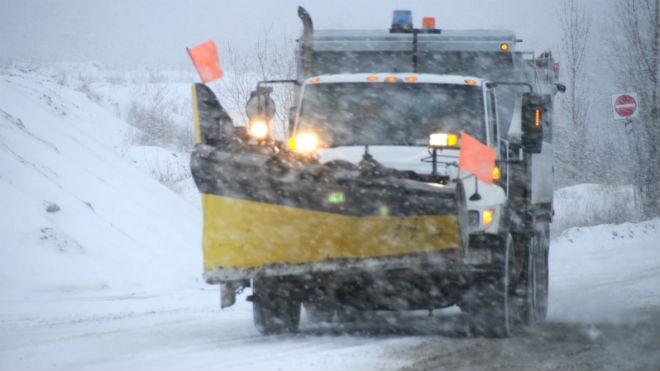Ontario's auditor general has released a damning report of the way the governing Liberals have handled the privatization of winter maintenance of the province's highways.
In a 43-page report released Wednesday, Auditor General Bonnie Lysyk said Ontario’s motorists have faced less safe winter highway conditions since 2009, when the Liberals changed the way they contracted out winter road maintenance in an attempt to save money.
Contracts were awarded primarily to the lowest bidders, Lysyk wrote, but in many cases, they did not have sufficient equipment to do the work.
“Over the past five years, winter highway maintenance service levels have declined from the level that Ontarians have historically been used to,” Lysyk said in the report, entitled Winter Highway Maintenance. The audit was requested by the Legislative Assembly’s Standing Committee on Public Accounts.
“The Ministry of Transportation has been successful in reducing and containing escalating winter maintenance costs, but the time it takes to clear highways during and after a storm, to make them as safe as possible for motorists in winter, has increased,” Lysyk said after tabling.
In 2009-2010, the most traveled highways in the province were cleared to achieve bare pavement, on average, in 2.1 hours after the end of a storm; this increased to an average of 4.7 hours after the end of a storm in the winter of 2013-2014, the auditor found. And six of the 20 contract areas did not even meet the province’s standard of clearing the most travelled highways within eight hours 90 per cent of the time, “a generous standard when compared to other jurisdictions,” the report said.
While privatization of winter maintenance began in the 1980s, the Ministry of Transportation continued to provide direction to the private sector contractors doing the work.
“In 2009, a significant change was made in the method of contracting for winter highway maintenance work when the province moved to performance-based contracts,” Lysyk said in a release. “These contracts gave contractors full autonomy in determining how they would get the work done. The province primarily chose contractors on the basis of the lowest price bid, versus selecting a contractor based on cost and ability to provide the expected level of services.”
While Greater Sudbury fared better than other cities in the North – 97 per cent of area highways were cleared within the target time – results were far worse in communities such as Kenora (69 per cent), Thunder Bay West (79 per cent) and Thunder Bay East (87 per cent).
“Quite frankly this government owes Ontarians an apology for putting many of their lives at stake based on saving a buck,” Michael Mantha, MPP for Algoma—Manitoulin, told Sault Ste. Marie's SooToday.com today.
Among the Report’s other findings:
- Even though ministry staff, including engineers, raised serious concerns during the procurement process for performance-based contracts that the majority of winning contractors would not be able to meet their winter maintenance commitments because of insufficient equipment, these lowest-price contractors were still awarded the contracts.
- The auditor noted that in one case, the lowest bidder actually ended up costing more than the next-highest bidder because the province had to step in and pay for more equipment to clear roads properly. If the next-highest bidder had been procured, the area could have been serviced with more equipment at a lower cost.
- Contractors under performance-based contracts used less highway treatment materials, resulting in less safe highways. In one contract area, anti-icing-liquid use over the winter season went from an average of 3.2 million litres under the original area maintenance contract to 9,500 litres in the first year of the performance-based contract.
- Patrolling to determine road conditions was no longer required to be conducted daily by contractors; instead, contractors were to “be aware” of road and weather conditions, and patrolled less often. As a result, equipment was not deployed soon enough before and during storms.
- Contractors faced fines for failing to meet their targets. However, the province waived $4.8 million of the $13.3 million in fines that were assessed during the winter of 2013-2014. The waiving of fines has not been handled consistently throughout the province.
“The report acknowledged that the ministry began taking steps in 2012 to restore service levels,” the release said. “Subsequently, the ministry funded contractors to add more equipment and use more anti-icing liquid, sand and salt to service highways, reducing ministry savings. The Ministry continues to undertake initiatives to restore service levels.”
Join Sudbury.com+
- Messages
- Post a Listing
- Your Listings
- Your Profile
- Your Subscriptions
- Your Likes
- Your Business
- Support Local News
- Payment History
Sudbury.com+ members
Already a +member?
Not a +member?
Sign up for a Sudbury.com+ account for instant access to upcoming contests, local offers, auctions and so much more.
